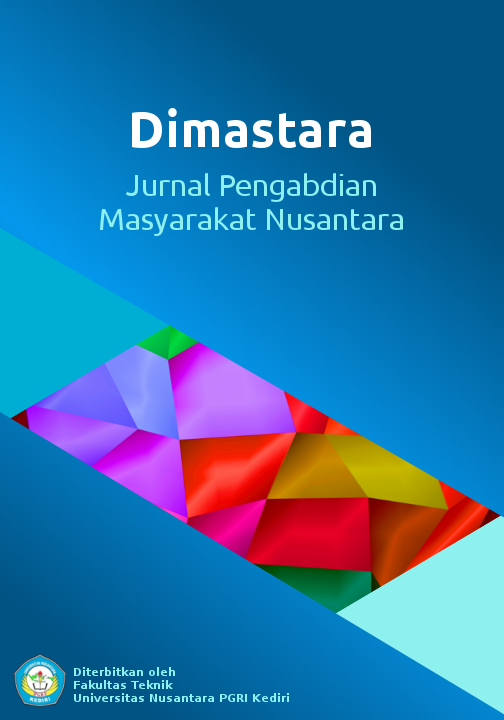Edukasi Kebersihan Diri (Personal Hygiene) pada Anak untuk Meningkatkan Kebersihan Diri Anak
DOI:
https://doi.org/10.29407/dimastara.v2i1.19288Keywords:
child hygiene, school education, personal hygieneAbstract
School children are at a golden age to teach the values of clean and healthy living behavior, which have the potential to become agents of change in socializing clear and healthy living behavior in the school, family and community environment. The COVID-19 crisis highlights the need to increase health literacy. Schools should act as health promoters for their students from an early age, by actively fostering healthy habits (physical activity, good personal hygiene, and a balanced diet) and raising awareness of the consequences of risky behavior. Proper personal hygiene knowledge and practices play an important role in avoiding communicable diseases and allowing primary school children to enjoy a healthy and productive school life. The purpose of this activity is to improve the health of early childhood by teaching personal hygiene to children.
Downloads
References
[2] X. Chen, L. Ran, Q. Liu, Q. Hu, X. Du, and X. Tan, “Hand Hygiene, Mask-Wearing Behaviors and Its Associated Factors during the COVID-19 Epidemic: A Cross-Sectional Study among Primary School Students in Wuhan, China,” Int. J. Environ. Res. Public Heal. 2020, Vol. 17, Page 2893, vol. 17, no. 8, p. 2893, Apr. 2020, doi: 10.3390/IJERPH17082893.
[3] A. Colao, P. Piscitelli, M. Pulimeno, S. Colazzo, A. Miani, and S. Giannini, “Rethinking the role of the school after COVID-19,” Lancet Public Heal., vol. 5, no. 7, p. e370, Jul. 2020, doi: 10.1016/S2468-2667(20)30124-9.
[4] V. Silalahi and R. M. Putri, “PERSONAL HYGIENE PADA ANAK SD NEGERI MERJOSARI 3,” JAPI (Jurnal Akses Pengabdi. Indones., vol. 2, no. 2, pp. 15–23, Jan. 2018, doi: 10.33366/JAPI.V2I2.821.
[5] M. R. Soleymani, S. Hemmati, H. Ashrafi-Rizi, and L. Shahrzadi, “Comparison of the effects of storytelling and creative drama methods on children’s awareness about personal hygiene,” J. Educ. Health Promot., vol. 6, no. 1, p. 82, 2017, doi: 10.4103/JEHP.JEHP_56_16.
[6] K. Ramadhani, H. Khofifah, D. Gizi, and K. Masyarakat, “Edukasi Gizi Seimbang sebagai Upaya Meningkatkan Pengetahuan pada Remaja di Desa Bedingin Wetan pada Masa Pandemi COVID-19,” J. Kesehat. Glob., vol. 4, no. 2, pp. 66–74, May 2021, doi: 10.33085/JKG.V4I2.4853.
[7] I. Nurmala, F. Rahman, A. Nugroho, N. Erliyani, N. Laily, and V. Anhar, Promosi Kesehatan. Surabaya: Airlangga University Press.
[8] M. Limbong and Mk. C. AKPER Surya Nusantara Pematangsiantar, “PENGARUH PENDIDIKAN KESEHATAN TENTANG PERSONAL HYGIENE TERHADAP PENGETAHUAN DAN SIKAP SISWA,” Excell. Midwifery J., vol. 1, no. 1, pp. 39–45, Jul. 2018, doi: 10.55541/EMJ.V1I1.27.
[9] B. Sudjana, I. Afriandi, J. T. B. Djais, P. / Hasan, S. General, and H. Bandung, “Correlation of Personal Hygiene Knowledge, Attitude and Practices among School Children in Sumedang, Indonesia,” Althea Med. J., vol. 3, no. 4, pp. 549–555, 2016, doi: 10.15850/AMJ.V3N4.937.
[10] R. Anggraeni et al., “Edukasi perilaku hidup bersih dan sehat untuk meningkatkan pengetahuan murid sekolah dasar,” Promot. J. Pengabdi. Kpd. Masy., vol. 2, no. 1, pp. 65–75, Jun. 2022, doi: 10.17977/UM075V2I12022P65-75.
[11] S. Y. Lee, S. Sasaki, H. Kurokawa, and F. Ohtake, “The school education, ritual customs, and reciprocity associated with self-regulating hand hygiene practices during COVID-19 in Japan,” BMC Public Health, vol. 22, no. 1, pp. 1–18, Dec. 2022, doi: 10.1186/S12889-022-14012-Z/TABLES/3.
[12] R. Nurhayati and S. Wuri, “Personal Hygiene Practices in 5th Grade Elementary School Students,” J. Heal. Educ., vol. 5, no. 2, pp. 94–100, Sep. 2020, doi: 10.15294/JHE.V5I2.30384.
Downloads
Published
Issue
Section
License
Penulis yang menerbitkan jurnal ini menyetujui persyaratan berikut:
- Hak cipta atas artikel apa pun dipegang oleh penulisnya.
- Penulis memberikan jurnal, hak publikasi pertama dengan karya yang dilisensikan secara bersamaan di bawah Lisensi Atribusi Creative Commons yang memungkinkan orang lain untuk membagikan karya dengan pengakuan atas kepenulisan dan publikasi awal karya tersebut dalam jurnal ini.
- Penulis dapat membuat pengaturan kontrak tambahan yang terpisah untuk distribusi non-eksklusif dari versi jurnal yang diterbitkan dari karya tersebut (misalnya, mempostingnya ke repositori institusional atau menerbitkannya dalam sebuah buku), dengan pengakuan dari publikasi awalnya di jurnal ini.
- Penulis diizinkan dan didorong untuk memposting karya mereka secara online (misalnya, di repositori institusional atau di situs web mereka) sebelum dan selama proses pengiriman, karena hal itu dapat mengarah pada pertukaran yang produktif, serta kutipan yang lebih awal dan lebih besar dari karya yang diterbitkan.
- Artikel dan materi terkait yang diterbitkan didistribusikan di bawah Lisensi Internasional Creative Commons Attribution-ShareAlike 4.0













